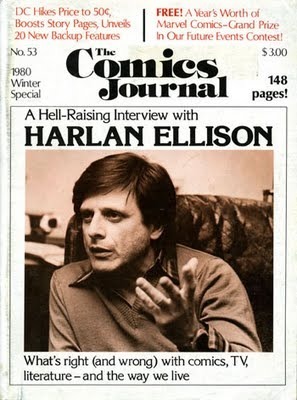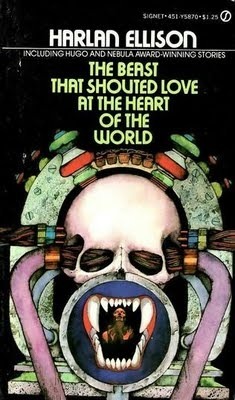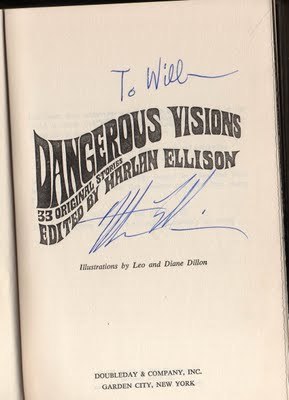Advance Team Tuesday: The sci-fi authors series continues with a long, rambling post about Harlan Ellison
More of my rambling, self-indulgent look back at some of the science fiction writers who indirectly inspired the graphic novel "The Advance Team," which hits stores in 2012.
I remember the first time I became aware of Harlan Ellison, mostly because I had no idea who he was. It was an issue of Starlog, sometime in early 1980s, and it was in an article focused on -- of all things -- a company that made baseball caps for science fiction movies. You know, like the caps the crew of the Nostromo wore in "Alien" (a movie that I hadn't seen at that point, either.) There was a picture of Ellison wearing (a) a big grin and (b) a baseball cap that said "HARLAN ELLISON." The caption under the photo said something along the lines of "Why is this man smiling?" I didn't know -- because I didn't know who that man was.

It wasn't until I started reading The Comics Journal a bit later that I encountered Ellison in all his mid-career glory. It's strange now, considering how Ellison and Comics Journal chief Gary Groth have become mortal enemies over the last few decades, but back then, you couldn't pick up an issue of The Comics Journal without seeing Ellison's face -- and I mean literally. There was that picture of him wearing a Tazmanian Devil T-shirt, the classic arms-folded, 1970s glasses pose and even an image in an ad for something called "The Harlan Ellison Record Club" (or something like that -- it's been a few years) where you could buy audio recordings of Ellison speaking. In other words, if you were reading The Comics Journal back then, you couldn't help but be aware of Ellison.
And that interview in the issue pictured above was -- and remains -- notorious. It was the talk, of course, that inspired the lawsuit from comics writer Michael Fleischer that dragged on for years (and, by most accounts, ended the Ellison-Groth friendship), but other than that it featured Ellison taking aim at just about everyone working in comics, and everyone working out of comics, too. I didn't know who the heck Jorge Luis Borges or Hunter S. Thompson or Donald Barthleme were, but I had to admit, it was interesting reading someone who obviously loved to talk go on about people like that -- and go on (and on and on) about himself, too. He sounded like a pretty interesting guy.
So, I scouted my local used book store (the Paper Back Shack in Niles, Ohio -- still in business!) for whatever copies of Ellison's writing I could find, then haunted the shelves of the local new bookstore (Waldenbooks, not in business) for the stuff of his that was still in print. I managed to build a fairly complete collection, everything from "The Beast that Shouted Love at the Heart of the World" (with the classic novella "A Boy and His Dog") to his two-part collection of TV writing, "The Glass Teat." A lot of it sailed over my head (especially all that talk about guys like Spiro Agnew in "The Glass Teat" books), but a lot of it connected, too.
 I've always thought Ellison's writing holds a special appeal for young men stumbling through adolescence with a little bit of frustration, a little bit of suspicion and a little bit of smarts -- or at least enough smarts to realize the world isn't what everyone's been telling you it is. Ellison obviously loves to write -- his stories are full of wordy, elaborate and imaginative names and whirlwind flights of fancy. This is no stripped-down prose trying to be grown-up, it's like a teen who just discovered he could make up his own stories was turned loose on a typewrite. Maybe that's why I liked Ellison so much as an adolescent -- he wrote the way I would have written if I could've written that way.
I've always thought Ellison's writing holds a special appeal for young men stumbling through adolescence with a little bit of frustration, a little bit of suspicion and a little bit of smarts -- or at least enough smarts to realize the world isn't what everyone's been telling you it is. Ellison obviously loves to write -- his stories are full of wordy, elaborate and imaginative names and whirlwind flights of fancy. This is no stripped-down prose trying to be grown-up, it's like a teen who just discovered he could make up his own stories was turned loose on a typewrite. Maybe that's why I liked Ellison so much as an adolescent -- he wrote the way I would have written if I could've written that way.
Loud, fast-paced, smart-assed, profane and full of big words and bigger attitude. And, more than anything, self-obsessed. When Ellison wasn't crafting his own autobiographical books ("Memos from Purgatory") or writing fiction that obviously starred some version of him (" 'Repent, Harlequin,' Said the Ticktockman"), he was penning long intros to his short story collections (and I mean intros to each story, not just for the whole book) or writing criticism and essays that wound up being reprinted -- where else? -- in the pages of The Comics Jousnal. It was heady stuff compared to most of the other fiction (and nonfiction, for that matter) that I was reading.
Ellison always preferred the term "speculative fiction" to "science fiction" (and boy oh boy did he hate the term "sci-fi"), mostly because few of his stories revolved around any sort of "science." Even the ones set squarely in some sort of technological future, like " 'Repent, Harlequin,' said the Ticktockman" or "Along the Scenic Route" just used a bit of thrown-together science to bring the stories to life. It was the characters and the tales that were important -- not the technology. And plenty of Ellison's stories fit into the "horror" or "fantasy" categories, with no science at all. That was the real fun of picking up a collection of Ellison's short stories -- you really never knew what you were going to get.
I kept reading and re-reading Ellison through high school and much of college, but eventually, the usual other interests came along and pushed most of my science fiction reading off to the side. (I was still reading The Comics Journal, though by this time, the Ellison had moved to the "enemies" column.) But, during my senior year at Kent State, we got word that Ellison was going to speak on campus to help raise money for a memorial to the Kent State students who , were shot by the Ohio National Guard back in 1970. (Ellison dedicated his short story collection "Alone Against Tomorrow" to those four students.)
Someone was going to interview Ellison for the pre-speech story, and as an editor on the school paper, I assigned myself that task. It was a phoner, as they say, and I spent the better part of two hours sealed up in an office talking to the guy I had once considered the greatest writer of all time. As you might guess, it was a fascinating conversation, because, even more than he loves to write, Harlan Ellison loves to talk. Much of the conversation, if I remember correctly, focused on the Kent State protests and the political aspects of the shootings (always a hot topic at my alma mater), but plenty of other topics were touched upon, too. His speech a few nights later was along the same lines, with plenty of question-and-answer time and a book signing afterwards.
Though I still had (and still have) all those paperbacks from my high school days, I only had one actual Harlan Ellison hardback in my collection, so that's what I took to get signed -- a book club edition of "Dangerous Visions," the groundbreaking science fiction collection compiled and edited by Ellison that arrived on this planet in 1967, the same year I did.
And yes, I still have that book, too.


I remember the first time I became aware of Harlan Ellison, mostly because I had no idea who he was. It was an issue of Starlog, sometime in early 1980s, and it was in an article focused on -- of all things -- a company that made baseball caps for science fiction movies. You know, like the caps the crew of the Nostromo wore in "Alien" (a movie that I hadn't seen at that point, either.) There was a picture of Ellison wearing (a) a big grin and (b) a baseball cap that said "HARLAN ELLISON." The caption under the photo said something along the lines of "Why is this man smiling?" I didn't know -- because I didn't know who that man was.

It wasn't until I started reading The Comics Journal a bit later that I encountered Ellison in all his mid-career glory. It's strange now, considering how Ellison and Comics Journal chief Gary Groth have become mortal enemies over the last few decades, but back then, you couldn't pick up an issue of The Comics Journal without seeing Ellison's face -- and I mean literally. There was that picture of him wearing a Tazmanian Devil T-shirt, the classic arms-folded, 1970s glasses pose and even an image in an ad for something called "The Harlan Ellison Record Club" (or something like that -- it's been a few years) where you could buy audio recordings of Ellison speaking. In other words, if you were reading The Comics Journal back then, you couldn't help but be aware of Ellison.
And that interview in the issue pictured above was -- and remains -- notorious. It was the talk, of course, that inspired the lawsuit from comics writer Michael Fleischer that dragged on for years (and, by most accounts, ended the Ellison-Groth friendship), but other than that it featured Ellison taking aim at just about everyone working in comics, and everyone working out of comics, too. I didn't know who the heck Jorge Luis Borges or Hunter S. Thompson or Donald Barthleme were, but I had to admit, it was interesting reading someone who obviously loved to talk go on about people like that -- and go on (and on and on) about himself, too. He sounded like a pretty interesting guy.
So, I scouted my local used book store (the Paper Back Shack in Niles, Ohio -- still in business!) for whatever copies of Ellison's writing I could find, then haunted the shelves of the local new bookstore (Waldenbooks, not in business) for the stuff of his that was still in print. I managed to build a fairly complete collection, everything from "The Beast that Shouted Love at the Heart of the World" (with the classic novella "A Boy and His Dog") to his two-part collection of TV writing, "The Glass Teat." A lot of it sailed over my head (especially all that talk about guys like Spiro Agnew in "The Glass Teat" books), but a lot of it connected, too.
 I've always thought Ellison's writing holds a special appeal for young men stumbling through adolescence with a little bit of frustration, a little bit of suspicion and a little bit of smarts -- or at least enough smarts to realize the world isn't what everyone's been telling you it is. Ellison obviously loves to write -- his stories are full of wordy, elaborate and imaginative names and whirlwind flights of fancy. This is no stripped-down prose trying to be grown-up, it's like a teen who just discovered he could make up his own stories was turned loose on a typewrite. Maybe that's why I liked Ellison so much as an adolescent -- he wrote the way I would have written if I could've written that way.
I've always thought Ellison's writing holds a special appeal for young men stumbling through adolescence with a little bit of frustration, a little bit of suspicion and a little bit of smarts -- or at least enough smarts to realize the world isn't what everyone's been telling you it is. Ellison obviously loves to write -- his stories are full of wordy, elaborate and imaginative names and whirlwind flights of fancy. This is no stripped-down prose trying to be grown-up, it's like a teen who just discovered he could make up his own stories was turned loose on a typewrite. Maybe that's why I liked Ellison so much as an adolescent -- he wrote the way I would have written if I could've written that way. Loud, fast-paced, smart-assed, profane and full of big words and bigger attitude. And, more than anything, self-obsessed. When Ellison wasn't crafting his own autobiographical books ("Memos from Purgatory") or writing fiction that obviously starred some version of him (" 'Repent, Harlequin,' Said the Ticktockman"), he was penning long intros to his short story collections (and I mean intros to each story, not just for the whole book) or writing criticism and essays that wound up being reprinted -- where else? -- in the pages of The Comics Jousnal. It was heady stuff compared to most of the other fiction (and nonfiction, for that matter) that I was reading.
Ellison always preferred the term "speculative fiction" to "science fiction" (and boy oh boy did he hate the term "sci-fi"), mostly because few of his stories revolved around any sort of "science." Even the ones set squarely in some sort of technological future, like " 'Repent, Harlequin,' said the Ticktockman" or "Along the Scenic Route" just used a bit of thrown-together science to bring the stories to life. It was the characters and the tales that were important -- not the technology. And plenty of Ellison's stories fit into the "horror" or "fantasy" categories, with no science at all. That was the real fun of picking up a collection of Ellison's short stories -- you really never knew what you were going to get.
I kept reading and re-reading Ellison through high school and much of college, but eventually, the usual other interests came along and pushed most of my science fiction reading off to the side. (I was still reading The Comics Journal, though by this time, the Ellison had moved to the "enemies" column.) But, during my senior year at Kent State, we got word that Ellison was going to speak on campus to help raise money for a memorial to the Kent State students who , were shot by the Ohio National Guard back in 1970. (Ellison dedicated his short story collection "Alone Against Tomorrow" to those four students.)
Someone was going to interview Ellison for the pre-speech story, and as an editor on the school paper, I assigned myself that task. It was a phoner, as they say, and I spent the better part of two hours sealed up in an office talking to the guy I had once considered the greatest writer of all time. As you might guess, it was a fascinating conversation, because, even more than he loves to write, Harlan Ellison loves to talk. Much of the conversation, if I remember correctly, focused on the Kent State protests and the political aspects of the shootings (always a hot topic at my alma mater), but plenty of other topics were touched upon, too. His speech a few nights later was along the same lines, with plenty of question-and-answer time and a book signing afterwards.
Though I still had (and still have) all those paperbacks from my high school days, I only had one actual Harlan Ellison hardback in my collection, so that's what I took to get signed -- a book club edition of "Dangerous Visions," the groundbreaking science fiction collection compiled and edited by Ellison that arrived on this planet in 1967, the same year I did.
And yes, I still have that book, too.

Published on July 03, 2011 00:10
No comments have been added yet.
Will Pfeifer's Blog
- Will Pfeifer's profile
- 23 followers
Will Pfeifer isn't a Goodreads Author
(yet),
but they
do have a blog,
so here are some recent posts imported from
their feed.



